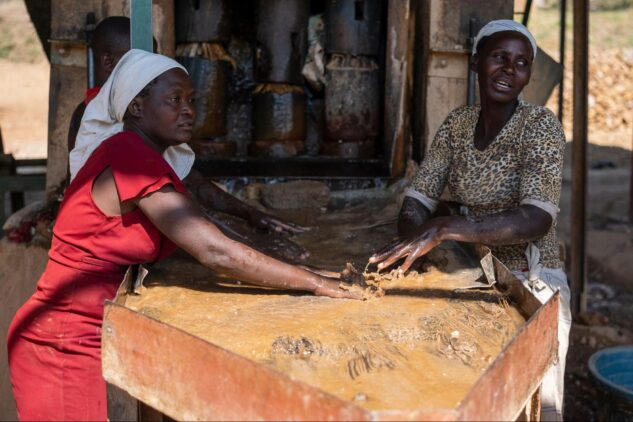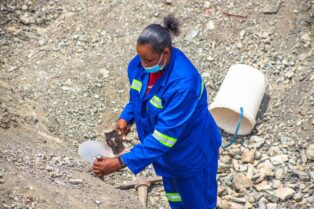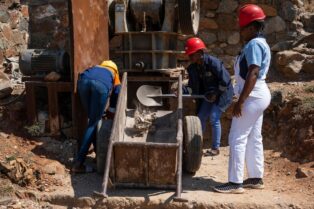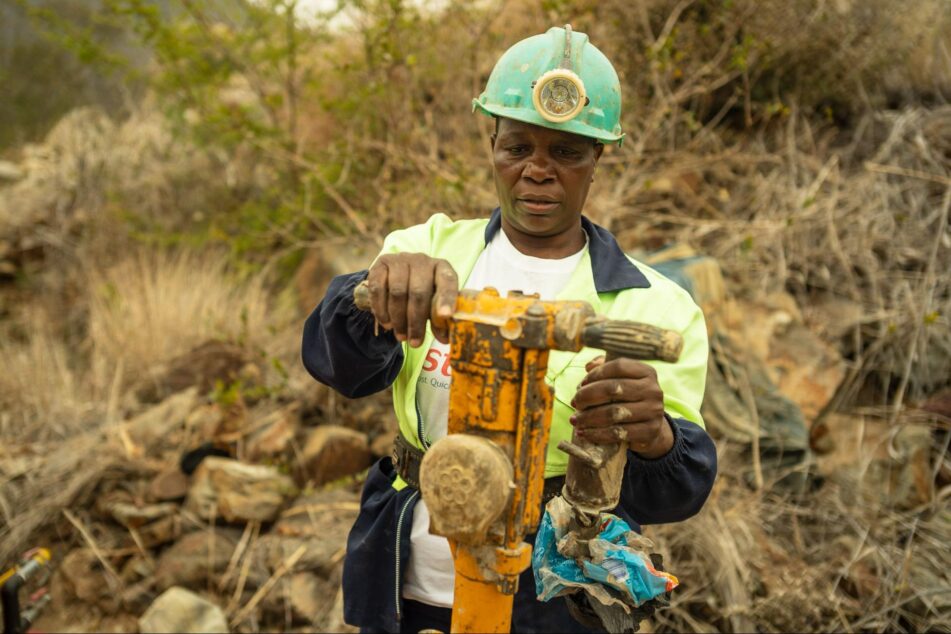Stories
Network Member Interview: Nyaradzo Mutonhori, Zimbabwe Environmental Law Association (ZELA)
In this interview, Nyaradzo shares her journey and what inspires her, along with the important work ZELA does in the field of land and environmental justice.
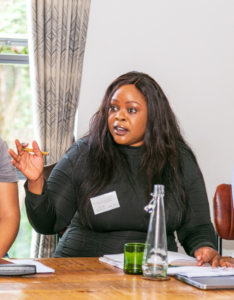
Nyaradzo speaking at a meeting.
What experience or individual inspired you to join the fight for land and environmental and gender justice?
My interest began when I was doing a module on women and women’s law as part of my undergraduate degree. Before that, I was taking corporate courses: banking, insurance, company law, and intellectual property law. I started studying women’s law, and then we went into the field for the first time to the communities. We were researching how women have been able to access the courts. I was part of a team that went to the region where I come from in Zimbabwe. We would go to the courts and find out what kind of cases women have been bringing to court and how long it has been taking them to get solutions to the different problems that they were facing as women, and whether they were getting proper access to justice.
When I finished that module, I joined a team of students. We had an office on campus where we would provide free legal advice and would allocate specific times to attend to different clients. What I noticed was that most of the clients visiting were women. When I began to research, I looked at the types of cases that women were bringing and the bottom line was that women did not have access to and control over resources, like land. Our inheritance and customary laws, and our patriarchal system, was inhibiting women’s access to land. When it comes to decision making and influencing laws and policies, what [the women] said was not considered to be important. And for me, that really sparked my passion to do more.
I’ve always carried a passion when it comes to women’s rights and I carry it in all the spaces that I’ve worked in. So when I joined ZELA, I continued to work to empower communities. What inspires me is the amount of passion the communities have. When I go into the communities, I meet so many women who are passionate and willing to use their own time and the limited resources that they have to raise awareness about the law for other women in their communities. For me, it is so humbling to find that women are dedicating their time to this. It’s a very difficult situation in our rural community because of the constant fight to put food on the table. And yet you have women who take time to say, “apart from all these duties that I have, I’m going to find time without being paid, without any incentive to go and speak to other women to say, as women, we can build our power.”
Was there a turning point or particular moment in your life that shaped you or had a lasting impact on your journey?
There have been many turning points, but one specific point still drives the kind of work that we [ZELA] do…One time, when we visited the Manicaland community during a drought, the mining companies had diverted all the water from the river. The women said, “Okay, Nyaradzo, let’s take you to the river so that you see what is happening.” They dug on the riverbed through the sand, and waited for the water to begin to come out from the ground. And they used the little water that came out to fill a 20-liter container. For me, that was really shocking.
That was a moment that I said to myself, ‘this is a turning point, we can’t do nothing in the face of such injustice.’
This inspired us to create a campaign on women’s access to clean water in mining communities. We drilled boreholes, but also took the companies to court. We ended up doing an entire media campaign, and in the end, the company was forced to open up the water source for the communities to have access to water. This happened in a mining site, protected by the military and the armed forces. But the women really had been pushed to the point…where they said ‘Okay, we need to take action.’ So for me, that was a very important turning point.
Being part of movements like the Legal Empowerment Network and the Feminists for a Binding Treaty Movement, where you are able to look at your own local struggles, look at the challenges when it comes to access to justice for women and marginalized groups, and see that local fights are connected to big issues – helps you see that the work that you are doing in your own local space matters, because it also can be used to influence global and regional frameworks, laws, and policies.
This work can be challenging and difficult. What inspires you and helps you keep going?
It takes a lot of resilience. At a personal level, I’ve found solidarity, support, and inspiration in the least expected places. You may be feeling discouraged – maybe you have taken a particular matter to court and maybe it’s dismissed on technicalities – and at the end of the day, [it feels like] you have failed to make that particular change in people’s lives that you would’ve liked to see.
But there is always that encouragement where even the communities can say, “Okay, let’s look at the silver lining. We may have failed to do this, but the fact that we have actually taken this issue to court is in itself a statement that we have made.”
For me, there’s always an inspiration in the communities that we work with, where I find most of them very supportive. Even the grassroots activists, they’re re-energized and inspired because of the work that they themselves will be doing. We lean on each other and keep each other going during difficult times.
Part of what also keeps us going is the fact that we [are] trying to manage expectations; [we] are also just being realistic. It’s also part of being in such a closed or shrinking civic space situation in Zimbabwe. I started doing this work in 2006. It’s been the same context [since]. I was just with some young people here from Zambia, Zimbabwe and Mozambique. We were trying to design a youth initiative on a corporate accountability campaign, and you would hear the young people in Zambia saying “we are actually going to do a march,” but for Zimbabwe, they would say, “we can do a Zoom meeting.” That’s how closed the space is. So in that closed space, I think what has also really kept me going is to create, to be innovative. It forces you to be creative.
I looked at the space of women and land and environmental justice, and I actually sat down with two other lawyers working in different organizations and said, “we need to create a separate space where women can speak about extractives.”
Women in mining communities need to have a free space. So this year, I’m happy to say we created the gender and extractives platform, and we managed to rope in the support of other organizations. Next week, we’re going to be having a seventh edition of the gender and extractive symposium that is being hosted by the platform. Finding ways to be be creative and innovative helps to keep us going because we really need to adapt to the context and find new ways of making sure that women continue to have their voice heard, that their rights are respected.
Through the platform on gender and extractives we have been calling for the promotion of women’s participation in the mining sector. It is important to note that it has been a fulfilling journey seeing artisanal and small-scale miners such as Shuvai Maphosa (above) contributing to the sector and making names for themselves.

